This is a page within the www.staffshomeguard.co.uk website. To see full contents, go to SITE MAP.
MEMORIES
AND INFORMATION - SURREY
58th
SURREY (PURLEY) BATTALION
|
 William
Battle, of Kenley, volunteered for Home
Guard service immediately formation of the Home Guard was
announced on 14th May 1940 and was a member of the
58th Surrey
(Purley) Battalion. He was a Platoon Commander
and appointment so quickly to such a position of
authority would almost certainly have implied
Great War service. Whilst many details of the latter
are as yet unknown, subsequent events were to
provide confirmation of this and some additional
information, including his unit, the
3rd Battalion,
Royal Fusiliers, the fact of his having been wounded
twice and one act of special bravery. William
Battle, of Kenley, volunteered for Home
Guard service immediately formation of the Home Guard was
announced on 14th May 1940 and was a member of the
58th Surrey
(Purley) Battalion. He was a Platoon Commander
and appointment so quickly to such a position of
authority would almost certainly have implied
Great War service. Whilst many details of the latter
are as yet unknown, subsequent events were to
provide confirmation of this and some additional
information, including his unit, the
3rd Battalion,
Royal Fusiliers, the fact of his having been wounded
twice and one act of special bravery.
William had not always been a
Surrey man. The 1911 census sees him
living at 45 High Street, Ramsey,
Huntingdonshire with his wife, Elizabeth, and
their four children, Bessie, Edith, Arthur and
Ethel. William
(b. 25 January 1879) and the two youngest children
were all born in Blunham, Bedfordshire; Elizabeth
and the two elder, in London.
Ethel unfortunately did not survive into adulthood;
and two more children, twins born in 1913, Jesse (a
daughter) and Sydney did not survive infancy either.
William's occupation is
recorded in 1911 as "Horse Slaughterer". Thirty
years later that grisly, typically
Victorian/Edwardian occupation has been left
behind and by the outbreak of WW2, twenty-eight
years later, we find him living at
Pyrford, Bourne View,
Godstone Road, Kenley with
Elizabeth and employed as a Messenger with
the National Provisional Bank
in High Street, Kenley.
The following image of him
and Elizabeth, the only one which survives,
shows them at the downstairs window of their
home, Pyrford, and perhaps in
happier times.
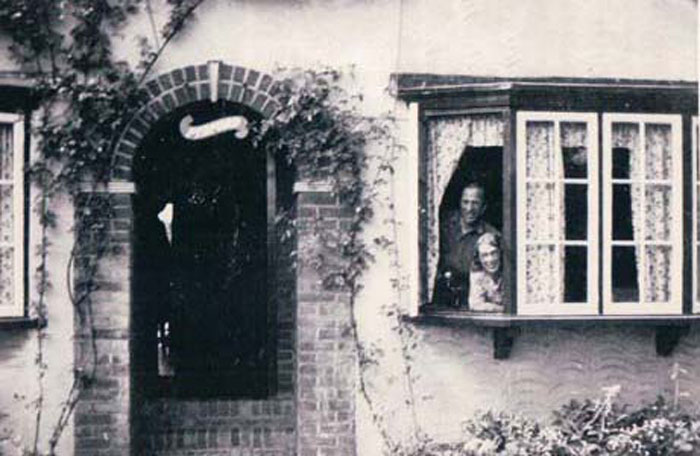
Only some nine or ten weeks after William formed his
Home Guard platoon and held its first parade, the nearby
RAF Kenley aerodrome, a Fighter Command base operating
Spitfires and Hurricanes, was about to receive a
massive attack from successive waves of Luftwaffe
bombers. It was Sunday, August 18th, 1940, at
lunchtime, between 1.00 and 1.30 p.m.
His great-granddaughter, Marcelle Williams, describes
what happened on that fateful day:
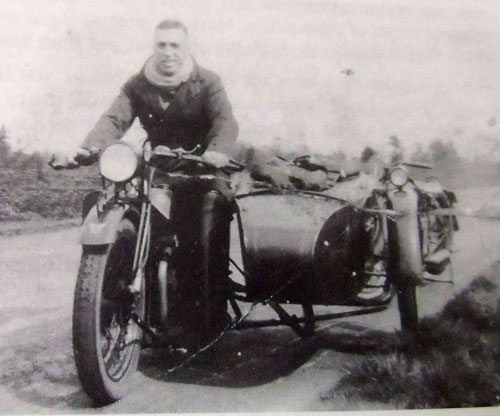 My great grandfather, the local Home
Guard Platoon commander, was at his post, I believe
with another member of the Home Guard, at the
Kenley
Waterworks, just below
RAF Kenley, when the first wave
of German bombers approached. They began dropping
bombs and unfortunately William who was watching their
approach was killed immediately. My great grandfather, the local Home
Guard Platoon commander, was at his post, I believe
with another member of the Home Guard, at the
Kenley
Waterworks, just below
RAF Kenley, when the first wave
of German bombers approached. They began dropping
bombs and unfortunately William who was watching their
approach was killed immediately.
William's policeman son,
PC Arthur William B. Battle,
(right)
was on duty in the area and decided to call on his
mother and older sister who lived close by to check on
them. When he got nearer to the house, he
quickly realised all was not well, and found out about
his father's death. He went to see his father's
body which was under a blanket.
A local person
recorded the aftermath of the attack from his bedroom
window close to the aerodrome.
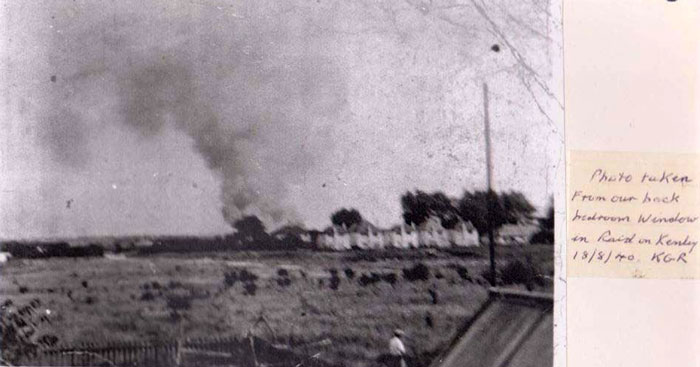
And a young WAAF,
Iris Cockle, who had
only recently arrived at the aerodrome, recorded her
experience of the violence of the attack for the BBC
People's War Archive.
My first proper posting was at Kenley
Aerodrome. It was now the August of 1940; I had
been there for about a week and was beginning to
enjoy my duties in the equipment section. My
department was responsible for everything from
aircraft parts to clothing and rations.
One
afternoon, during a quiet spell, a male sergeant
asked me if I would take charge whilst he and a
few colleagues took a break. Shortly after he
had left I heard the ominous tones of the air
raid siren. The next thing I saw were planes of
the Luftwaffe hedge-hopping across Kenley,
dropping bombs and raking the area with gunfire.
I threw myself into my section’s dugout to find
that I was the only occupant. For the next few
minutes I just sat there frozen with fear as the
air raid exploded above me. Then came the
deafening silence after the planes had passed
over followed by the sound of a voice. “Hey
Blondie,” it said, “you’d better get out of
there. There’s an unexploded bomb on the roof of
your dugout!” It was a young aircraftman who had
stuck his head into the dugout to see if anyone
was still alive. I vacated what I thought was my
safety zone as quickly as I had entered it.
When
I came up into the light all that I could see
was devastation everywhere. There were great
scoops ripped into the ground that had been
created by the bombs. Rubble from what were once
buildings lay scattered everywhere. Vehicles lay
on their sides; some with smoke and flames
billowing from them. A German plane had buried
itself nose down in the ground. Worst of all was
the sight of comrades lying either dead or
injured. Fortunately for me, what had landed on
top of my dugout was only an empty shell case.
I started to help with the cleaning
up........
©
Iris Cockle 2003. To read the entire
memoir, please click
here. (You will leave this
site. WW2 People's War is an online archive of
wartime memories contributed by members of the
public and gathered by the BBC. The
complete archive can be found
here. |
William Battle had not
been so lucky. His untimely death was reported shortly
afterwards in the local press.
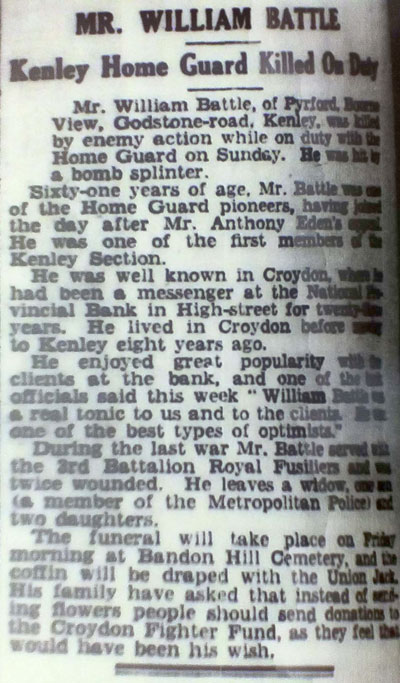 MR.
WILLIAM BATTLE MR.
WILLIAM BATTLE
Kenley Home Guard
Killed On Duty
Mr. William Battle,
of Pyrford, Bourne View, Godstone Road,
Kenley, was killed by enemy action while on
duty with the Home Guard on Sunday. He was hit
by a bomb splinter.
61 years of age,
Mr. Battle was one of the Home Guard
pioneers having joined the day after Mr.
Anthony Eden's appeal. He was one of the first
members of the Kenley Section.
He was well known
in Croydon where he had been a messenger at
the National Provincial
Bank in High Street
for 25 years. He lived in Croydon before going
to Kenley eight years ago. He enjoyed great
popularity with the clients at the bank and
one of the officials said this week "William
Battle was a real tonic to us and to the
clients. He was one of the best types of
optimists".
During the last war
Mr. Battle served with the
3rd Battalion,
Royal Fusiliers and was twice wounded. He
leaves a widow, son (a member of the
Metropolitan Police) and two daughters.
The funeral will
take place on Friday morning at
Bandon Hill
Cemetery and his coffin will be draped with
the Union Jack. His family have asked that
instead of sending flowers people should send
donations to the Croydon Fighter Fund as they
feel that this would have been his wish. |
And then, reports of
the funeral which tell us more about William Battle.
|
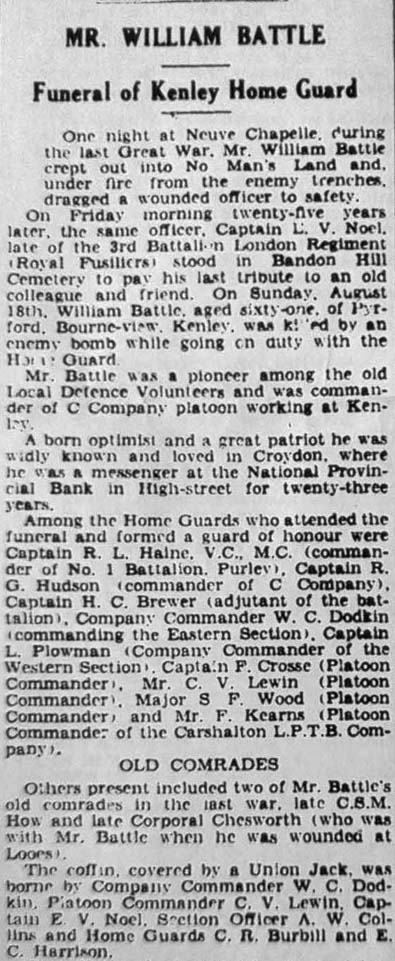 MR. WILLIAM
BATTLE MR. WILLIAM
BATTLE
Funeral Of
Kenley Home Guard
One night at
Neuve-Chapelle during the Great War, Mr.
William Battle crept out into No Man's Land
and, under fire from the enemy trenches,
dragged a wounded officer to safety.
On
Friday morning, twenty-five years later, the
same officer, Captain L. V. Noel, late of the
3rd Battalion, London Regiment (Royal
Fusiliers) stood in Bandon Hill Cemetery to
pay his last tribute to an old colleague and
friend. On Sunday August 18th, William Battle,
aged 61, of Kenley was killed by an enemy bomb
while going on duty with the Home Guard. Mr.
Battle was a pioneer among the old Local
Defence Volunteers and was commander of "C"
Company platoon working at Kenley.
A
born optimist and a great patriot, he was
widely known and loved in Croydon where he was
a messenger at the National Provincial Bank in
High Street for 23 years.
Among the
Home Guards who attended the funeral and
formed a guard of honour were:
Captain R. L.
Haine, V.C., M.C. (commander of No. 1 Battalion,
Purley),
Captain R. G. Hudson (commander of
"C" Company),
Captain H. C. Brewer (adjutant
of the battalion),
Company Commander
W.C.
Dodkin (commanding the Eastern Section),
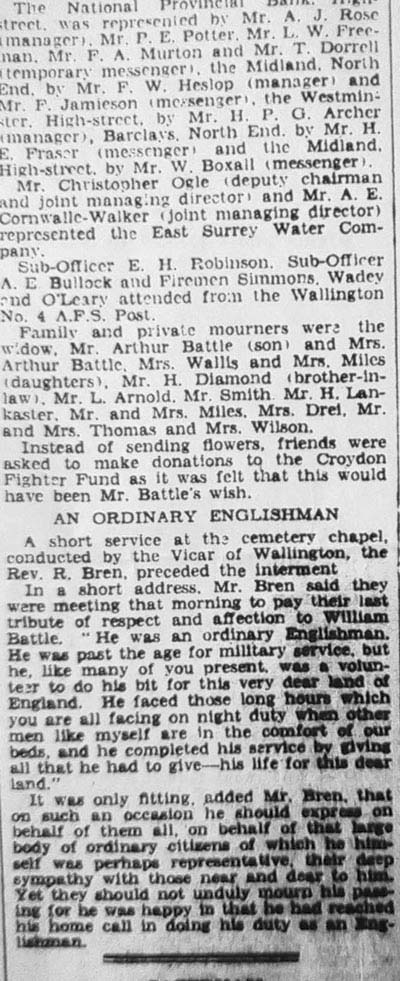 Captain L. Plowman (company commander of the
Western Section), Captain L. Plowman (company commander of the
Western Section),
Captain F. Crosse (Platoon
Commander,
Mr. C. V. Lewin (Platoon
Commander),
Major S. F. Wood (Platoon
Commander) and
Mr. F. Kearns (Platoon
commander of the Carshalton
L.P.T.B.)
OLD COMRADES
Others present included
two of Mr. Battle's old comrades in the last
war, late C.S.M. How and late
Corporal
Chesworth (who was with Mr. Battle when he was
wounded at Loos).
The coffin covered by a
Union Jack was borne by:
Company Commander W.
C. Dodkin, Platoon Commander C. V. Lewin,
Captain E. V. Noel,
Section Officer A. W.
Collins and
Home Guards
C. R. Burbill and
E. C.
Harrison.
The National Provincial Bank,
High Street was represented by
Mr. A. J. Rose
(manager), Mr. P. E. Potter,
Mr. L. W. Freeman,
Mr. F. A. Murton and
Mr. T. Dorrell
(temporary messenger), the
Midland North End
by Mr. F. W. Heslop, (manager) and
Mr. F.
Jamieson (messenger), the
Westminster, High
Street by Mr. H. P. G. Archer (manager),
Barclays North End by
Mr. H. E. Fraser
(messenger) and the Midland, High Street by
Mr. W. Boxall (messenger).
Mr.
Christopher Ogle (deputy chairman and joint
managing director) and
Mr. A. E.
Cornwalle-Walker (joint managing director)
represented the East Surrey Water Company.
Sub-Officer E. H. Robinson,
Sub-Officer A.
E. Bullock and
Firemen Simmons, Wadey and
O'Leary attended from the
Wallington No. 4
A.F.S. Post.
Family and private
mourners were the widow,
Mr. Arthur Battle
(son) and Mrs. Arthur Battle,
Mrs. Wallis and
Mrs. Miles (daughters),
Mr. H. Diamond
(brother-in-law), Mr. L. Arnold,
Mr. Smith,
Mr. H. Lankaster,
Mr. and Mrs. Miles,
Mrs.
Drell, Mr. and Mrs. Thomas and
Mrs. Wilson.
Instead of sending flowers, friends were
asked to make donations to the
Croydon Fighter
Fund as it was felt that this would have been
Mr. Battle's wish.
AN ORDINARY
ENGLISHMAN
A short service at the
cemetery chapel, conducted by the Vicar of
Wallington, the Reverend R. Bren preceded the
internment.
In a short address Mr. Bren
said that they were meeting that morning to
pay their last tribute of respect and
affection to William Battle. "He was an
ordinary Englishman. He was past the age for
military service and he, like many of you
present, was a volunteer to do his bit for
this very dear land of England. He faced those
long hours which you are all facing on night
duty when other men like myself are in the
comfort of our beds and he completed his
service by giving all that he had to give –
his life for this dear land."
It was
only fitting, added Mr. Bren, that on such an
occasion he should express on behalf of them
all, on behalf of that large body of ordinary
citizens of which he himself was perhaps
representative, their deep sympathy with those
near and dear to him. Yet they should not
unduly mourn his passing for he was happy in
that he had reached his home call in doing his
duty as an Englishman.
|

William is commemorated in the Croydon Roll of Honour.
William Battle is
thought to be the first Home Guard to have been killed
by enemy action in the Second World War. May he
continue to be remembered with honour and respect by
later generations of his family; and by those,
including visitors to this website page, who see his
name commemorated elsewhere.
*********************
Both
William's family and staffshomeguard would welcome
any further information about
William Battle
and the man whose life he saved in
1915,
E. V.
Noel
If
you can help, please contact us via the Feedback
link below.
ACKNOWLEDGEMENT
is gratefully made
to Marcelle Williams for providing most of the
above information and generously permitting
its publication; to The Commonwealth War
Graves Commision; to Iris Cockle and the BBC
People's War Archive; to Croydon Library; and
to other unidentified sources of the above
information
Personal image ©
Marcelle Williams 2018
|
x159 April 2018 |